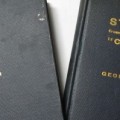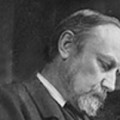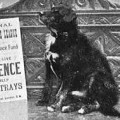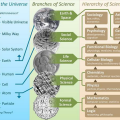This is one of the earliest vegetarian children’s stories in English that we have discovered.
George Bedborough’s thinking is delightful. I particularly love his reflections on militancy.
! Please remember that this story was written more than 100 years ago – just pre-WWI – it is ‘pre-factory farming’ & does not go ‘all the way to vegan’. The ‘non-vegan’ section is highlighted in purple. Mrs Duck and Mrs Cow are pragmatists – ……but neither had considered that their children would be murdered.
Mrs Cow predicting ‘veganism’ – ……if humans become – ……so, wise that he (they) could do, without butter and milk…… !
For anyone who wishes to go deeper into understanding the histories of the connected personalities; there are many notes below.
For anyone who wishes to support the Ernest Bell Library, please be in touch!
………………………………………………………………………………………………………
Now, let us focus on the story…..
Children, are you sitting comfortably?
Now we shall begin……
‘The Isle of Vegetariana’
MANY years ago a dear old man (whose name nobody knows) discovered the Island of Vegetariana. He was a pioneer in more ways than one. He was one of those people who made up their minds that a thing ought to be, and then if it does not exist they invent it and make it exist. He started out to discover the Isle of Vegetariana, and it is not quite certain at this late period whether he really discovered it or brought it into existence himself. Of course nobody could make an island of the size of Vegetariana, but the most wonderful fact in the world is that any island could become a Vegetariana if its inhabitants wanted it. This great and good man (whose name is forgotten) was the only human inhabitant of the island he had discovered, and as he very much wanted it to be Vegetariana, it had to be what he wanted. You will ask, what is Vegetariana? Vegetariana is the name of an island where nobody ever kills animals for food or “sport.” It is easy to guess how pleased the animals are in countries where the inhabitants decide to make the land a Vegetariana.
How do I know the animals of Vegetariana were glad? How do I know anything about the thoughts and feelings of animals? Suppose the day should ever come when the deaf hear and the eyes of the blind are opened! What queer things the deaf would hear and the blind see! The queerest thing of all is that they would only hear and see what is going on all day long at present; the music today is in their deaf ears silent, the beauty of the world is only unseen by the blind. If we ever learn to understand the animals’ language the novelty will only be ours; the animals speak to us and to one another now and ever and anon. If we love them we shall try to think what it is they want to say to the children of men who rule them and for whose sake they are killed all the day long.
The very first time the animals of Vegetariana learnt that the day of slaughter was ended they met in public meeting to express their thanks for this great boon of life. They did not ask for votes. All they wanted was to be allowed to live. Some of them claimed to be independent like Master Rabbit, who saw no reason why he should be put away into a nasty little “hutch” and made to eat cabbage leaves and other indigestible things supposed to be good for him. He wanted to run wild and choose his own food. He only asked that men should not come out every August with guns to kill or wound or cripple him while he scampered across the meadows. Mrs. Duck had ideas of her own, and, being a lady, she did not mind saying so. She did not object to her eggs being taken away to deck the table of those who indulged in a taste for eggs which she could never hope to understand or appreciate. She too thought that if she contributed so generously to the human breakfast, she might be permitted to live out her own life without help or hindrance from mankind. Madam Cow had no special desire for independence. Long ago her ancestors had been wild, but she had lost the taste for a roving life. She was willing to give her milk to man so long as-man desired it. If man grew so, wise that he could do, without butter and milk, Mrs. Cow thought she would have nothing left to do after having served mankind so long and well. She was greatly relieved at the new order of things, and her milk became sweeter and fresher than ever.
It was dawn of hope for the animal world. From that day forth every animal felt better in health and temper. A long life was before each of them, and it is quite in accordance with what one would expect, that a race which was assured of peaceful life began to improve itself. The learned ass brayed more intelligently, the cows chewed the cud and learnt to discuss the events of the day like the perfect ladies they were. Piggy and Rooster became friends, Bunny was as tame without a “hutch” as ever he had been with one, and nobody was afraid of anything or anybody.
For many years the animals learnt from friendly man all he knew and, when he died, their children and their children’s children became wiser and wiser, as well as happier and happier. Their first grief was the death of the dear old man who discovered their island. For the first time in the history of man’s relations with the animals there was a public procession of ALL his domestic friends to pay a last tribute of respect to their dead human friend. This was most unusual, but only in so far as it was an organized procession. All of us have seen (or at least heard of) some dog or cat or other lowly friend of man sorrowing at the grave of a lost master. Many a dog has gone without food and died, refusing to be comforted, refusing to be fed, refusing to live alone when the one he knew and loved had departed for ever from his side. It was but a step farther in the progress of animal intelligence when these Island animals met together, walked in one long line to the house where their man friend lay dead, and there they lifted up their voices in doleful sympathy.
It is not easy to trace the upward growth of a whole race, even when one small island contains the total tale. But in this case there were great difficulties in the way of studying the history of Vegetariana. An island where there are no human beings does not advertise. Neither does it possess newspapers nor picture postcards. We have to rely upon travellers whose tales vary according to their own characters and powers of observation. Some travellers say there is no such island. But how do they know this, unless they have been there to see? Some say that Vegetariana is in Utopia, which is a very long way away. Even those who do not want to make their land a Vegetariana have told of the wonderful things which would happen if all the world became converted and ceased to kill animals. The latest story about Vegetariana is by a certain butcher who survived a visit to the Island, and who has never killed an animal since.
Mr. Smith was a well-known butcher on the south coast. He was making much money at his trade, and he often visited the “Hen and Chickens.” No, it was not that he was friendly with these feathered egg-producers; the “Hen and Chickens ” was the name of a beer-shop where Mr. Smith hid his brains beneath the foaming intoxicant sold there. One day, having a holiday, after a visit to the beer-shop Mr. Smith determined to visit and conquer the Island of Vegetariana. It seemed such a waste to think of hundreds of cattle, sheep, and fowl living happy lives with nobody there to kill them and sell their flesh for others to eat. It is unknown how long Mr. Smith’s voyage lasted. The landlord of the “Hen and Chickens” says Mr. Smith did not stir outside the inn all day. On the other hand, we have Mr. Smith’s story from his own lips, and this is what he tells us happened. He arrived on the Island rather hungry and very thirsty, and the first thing he saw was a big trough of the clearest looking spring water. He did not care for water as a rule, and he had never drunk out of a trough before. But his thirst overcame his scruples, and he drank deeply, while dozens of animals of all sorts gathered round him in the most friendly fashion. Then he found a whole host of fruit and nuts had been gathered by unseen hands and placed before him. He enjoyed the good things, and presently he saw a cosy looking bed of the softest grass placed for him to lie upon.
Mr. Smith had taken the precaution of bringing with him his big knife and chopper. He went to sleep determined to wake up presently and begin his horrid work of slaughter. As soon as he slept most of the animals sauntered away and left him in peace. When he woke he found a particularly friendly little lamb had cuddled up to him on his bed. Will it be believed, this was the first victim of the murderous traveller! Presently another and another fell as prey to his evil assaults. Their bodies he stowed away in safety ready to place on his boat when he returned home.
It was a long time before the Vegetariana animals realised the nature of this treachery and abuse of their generous hospitality. The mother sheep missed a lamb, the cow her calf, the chickens their parents, and a great cry was heard in all the Island. Mr. Smith listened without emotion, then looked on to see what next these intelligent animals would do, for he had heard much about their wonderful and almost human talents.
He had not long to wait. In the big open meadow by the sea a public meeting was held, attended by almost all the inhabitants. Mr. Smith says there was a great black bull present who seemed to be chairman, and he even reports that some sort of resolution was proposed, seconded, and in proper form put to the meeting and carried unanimously by the assembled hosts of horses, cows, sheep, dogs, cats, rabbits, pigs, ducks, geese, hens and their families.
At this point Mr. Smith becomes a little vague. It is not easy to fit in the period he spent on the Island with the time he was away from home (or from the “Hen and Chickens.”) Perhaps he visited the Island more than once, and has confused his dates, as many travellers do. Anyhow, he is quite positive that within an hour or two of the meeting ending there was a regular march of “sandwich” animals through the principal thoroughfares. Each animal wore round his neck a board with appropriate sentiments of protests against the meat-eating world in general and Mr. Smith in particular. “NO KILLING” was the Duck’s motto. (It reminded me of a play I once saw called “The Duke’s Motto.”). “IT IS CRUEL” hung from the hen’s head. Bunny bounced brightly along bearing a board boldly attacking butchery. “CEASE IT,” said piggy; “DOWN WITH MR. SMITH,” said the sheep; “‘LIVE AND LET LIVE ” loomed in large letters on the lamb’s little label. The cow came along comfortably, her collar consisting of a curious card containing this clause; “COWS CLAIM COMPASSION.”
Mr. Smith was greatly amused, and, according to his story, he would have turned again to his wicked work of butchery, heedless of protest, demonstration, appeal or reasoning. He seized his long-knife, and was about to start killing a fat sheep, when he became conscious of a totally different movement. It appears the animals were divided into two sections. Mr. Smith had been interested in, but not affected by, what he understood to be the “Constitutional” section. He now began to attract the attention of the “Militants,” quite another set altogether. These animals were evidently organised like the others, but they wasted no time in useless appeals.
A few ducks and geese at first annoyed him with their constant yells, then a battalion of pigs and rabbits began to overwhelm him. These were joined by a host of dogs and sheep whose courage, multiplied by their numbers, made Mr. Smith take a sudden interest in the shore where his boat lay. He looked behind him as he took a few hasty strides, and the sight of a dozen sturdy bulls preparing to join in the pursuit caused the butcher to come to a hasty decision. He lost his knife in his flight, and without hesitating longer than was needed to unknot his boat rope, he was soon at sea again making for home by the shortest possible route.
The landlord of the “Hen and Chickens” has said many things about Mr. Smith. Mr. Smith says that the sleeping mixture which the landlord calls beer might have made the landlord dream that Mr. Smith remained in the “Hen and Chickens.” This is just as likely as that Mr. Smith dreamt he went to the Isle of Vegetariana. I am quite sure that Mr. Smith is right (I do not say his story is to be credited), because he has become a Vegetarian ever since he brought back the report of the “Vegetariana Animals’ Protest.” He thinks he would not like his own children to be attacked by cows and sheep and pigs, and he reasons that cows and sheep and pigs have children of their own. This sounds more like a calculation than a sentiment, but I think he means (what the lamb’s motto meant): “Live and Let Live.”
George Bedborough
Repetition
! Please remember that this story was written more than 100 years ago – just pre-WWI – it is ‘pre-factory farming’ & does not go ‘all the way to vegan’. The ‘non-vegan’ section is highlighted in purple. Mrs Duck and Mrs Cow are pragmatists – ……but neither had considered that their children would be murdered.
Mrs Cow predicting ‘veganism’ – ……if humans become – ……so, wise that he (they) could do, without butter and milk…… !
………………………………………………………………………………………………………
The Books & Magazines in the Ernest Bell Library
This children’s story & these accompanying cartoons originally appeared in the monthly magazine – The Children’s Realm – in 1913. The story was later reprinted the following year in the compilation: –
Title: Stories from the Children’s Realm
Author: George Bedborough
Publisher: Vegetarian Federal Union
Publication Date: 1914
See – 100 years old plant-eating identical twins! – for much more about the book(s).
We have not yet been able to identify the cartoonist – ‘Megg’.

A teaser! Ernest Bell’s bound copies of – The Children’s Realm.
We are looking after 84 consecutive issues – from Vol. 1 Issue 1 to Vol. 7 Issue 12.
We are raising funds to preserve & duplicate these. If anyone would like to help, please contact us.
The little magazine ran through to the end of 1914 – the British Library in London also has the – 1913 & 1914 issues.
More here – https://www.happycow.net/blog/the-first-ever-magazines-for-vegetarian-children/
………………………………………………………………………………………………………
The People
George Bedborough was a close friend of / collaborator with Henry S. Salt, Ernest Bell, Bertram Dobell & many other great thinkers of his generation.
A George Bedborough quotation: –
~ H. S. Salt, who writes English uncommonly well, formed a brave humane trio with Bell and Dobell. ~ (1)
Written by – George Bedborough – in his 1919 book – The Atheist. (referring to Henry S. Salt, Ernest Bell & Bertram Dobell) (2)
George Bedborough was a member of the Royal Society of Literature.
The Ernest Bell Library is working to revive the writings of great humanitarians.
See here for more information about Henry S. Salt, Ernest Bell and the Ernest Bell Library.
For anyone who would like to know more about George Bedborough & Bertram Dobell, see the bio of George Bedborough & the notes on Bertram Dobell, which are under this.
………………………………………………………………………………………………………
George Bedborough – bio excerpt
An 1898 biographical article on George Bedborough by Sidney Laytone –http://dwardmac.pitzer.edu/Anarchist_Archives/coldoffthepresses/lucifer716/Pages/1.html– visit page 2 also –http://dwardmac.pitzer.edu/Anarchist_Archives/coldoffthepresses/lucifer716/Pages/2.html
A big chunk of the bio –
George Bedborough was born in London, of Berkshire parents in 1870; his father, a retired Church of England preacher, still lives and cordially detests the work to which his son has devoted a promising career. George’s mother was a woman of rare genius, a poet and thinker whose fame never travelled outside the immediate circle of the family acquaintance. Her son inherits her distrust of the literary judgment of the crowd.
Educated at Dulwich College, he early showed an interest in the study of literature. His earliest efforts were given to a manuscript magazine of the usual amateur type. Since then he has contributed regularly to several famous and obscure papers, including “Sunday Chronicle,” “Shafts,” ” University Magazine,” “Newcastle Weekly Chronicle,” “South London Mail,” etc.
His first public work was undertaken at the age of sixteen, when he founded, in conjunction with W. T. Stead, “The Workhouse Aid Society.” A well-intentioned medium for supplying the London workhouses with literature. As a radical he worked hard for the right of free speech in connection with the Trafalgar Square – he was present in the Square on ” bloody Sunday” – and he followed Linnell to his grave in the procession led by Annie Besant, William Morris and W. T. Stead.
Mr. Bedborough’s interest in the sex question dates from his earliest youth. His mother was a woman of fine imagination. His father was incapable of appreciating any art but music. Literature was a sealed book to him. Not withstanding his possession of a vast theologica library. Mr. Bedborough is very reticent in all his allusions to his father, but reading between the lines it is easy to see that his parents’ union was far from perfect. A youngest son, his mother’s confident, he understood with love and reverence the inner history of a beautiful later after and accomplished Treasurer of the Legitimation League, an event occurred which definitely dated George Bedborough’s as to sundry other horrors of state government. One of his brothers married a singularly beautiful woman of whose ancestry he was ignorant. Discovering when too late, and after three children bad been born, that her stock was tainted with insanity, he endeavored to minimise the potential evils as far as possible. The law refused to help him, until one day without warning she murdered one little darling and was tried and convicted for manslaughter. Her trial was a farce. Suggestions that she had inherited the insanity of her grandparents were laughed to scorn in this age of Darwinism, and she was sentenced to a long term of imprisonment. She was subjected to the horrors of a convict life for some weeks before the doctors would admit their mistake, and she is now living in the prison lunatic asylum, hopelessly insane.
Mr. Bedborough joined the Legitimation League, but showed little interest in it until Edith Lanchester was incarcerated in a Lunatic Asylum for daring to think freely on the question of marriage. He at once suggested that the League should take action. Public meetings were organized, public opinion stirred, the press was forced to realize that a great wrong had been perpetrated, and finally the release of Edith Lanchester was secured. The work of rescue was followed by a deputation to the Royal Commission of Lunacy, who consented to hear the case in favor of a . prosecution by them against Dr. Blandford who certified to the lunacy of that most sane and brave woman. The case in favor of prosecution was left in the hands of Herbert Burrows, Amy Morant* and George Bedborough, whose speeches before the Commissioners are now historical.
Mr. Bedborough told me his favorite pastime (how can such a busy man find leisure?) is the theatre. He has done considerable work as a dramatic critic. He regards the theatre as the most promising field for the growth of ideas. He hates didactic plays, however, and believes in the much abused phrase “Art for art’s sake.” He is a member of the Playgoers’ Club, and holds founder’s shares in the Independent Theatre.
He has a unique library, including many volumes of plays dramatic criticism, etc., as well as what he humorously describes as his tool chest-a collection of books on marriage, sex and anthropology.
A prophet honored in his own country, a pioneer with a gift of humor, an organizer without enemies, the youngest and smartest editor in old England, a living paradox, he must carve a name for himself in the annals of his country. He is the most dramatic figure in the ranks of advanced thought. May he long remain so.
………………………………………………………………………………………………………
George Bedborough – Victimized by London UK Undercover Police
He was an early victim of undercover UK police infiltrating ‘subversive groups’. ……..~ George Bedborough was arrested for selling a copy of Dr. Havelock Ellis’s Sexual Inversion to an undercover policeman. While Ellis’s volume, the first scientific study of homosexuality published in English, was indeed scandalous, it seems the police were interested not in the book but in the Legitimation League. Surveillance of the group’s activities had left the police without a case: the content of The Adult was ‘within the law’ (not smut!) and ‘there was never any suggestion of indecorous behavior at League meetings.’ But the police worried that the success of The Adult and the growing popularity of the Legitimation League gave support to more dangerous groups. ~ – source – https://pennrare.wordpress.com/2013/02/04/smut/
Another – ~ The police evidence about the entrapment of Bedborough, however, makes clear that they were not interested in him, or the Adult, or Ellis and his work, or even in obscenity. What the police wanted to do – and they did – was to destroy the Legitimation League because its monthly meetings provided a platform that allowed various anarchist groups whom they had under surveillance to congregate and speak. The detective John Sweeney remarked of the lectures at the monthly Legitimation League meetings, many of which were published in The Adult, that they ‘were often of an entirely innocent and even elevating nature, but the public discussions after the lecture were mainly supported by Anarchists, and some speeches of a highly incendiary character were occasionally delivered’. Thus, the police were more concerned with a ‘virtual community’ of radicals than with individual speech or thought. ~ – source –http://www.19.bbk.ac.uk/article/viewFile/450/310
………………………………………………………………………………………………………
More Notes
(1) – The Atheist by George Bedborough – p 20 –here.
(2) – about Bertram Dobell
Bertram Dobell obituary –here.
http://www.henrysalt.co.uk/bibliography/essays/thomson-and-thompson
Excerpt –
Viewed even from a purely literary standpoint, I prefer James Thomson’s eulogy of Shelley’s verse, as a saner yet not less finely-worded eulogy, and a worthy tribute to one who he acclaimed as “Poet of poets and purest of men”:-
So subtly sweet and rich are the tones, so wonderfully are developed the prefect cadences, that the meaning of the words of the singing is lost and dissolved in the overwhelming rapture of the impression. I have often fancied, while reading them, that his words were really transparent, or that they throbbed with living lustres.
It is unfortunate that Thomson’s poem and prose essay on Shelley are so little known, for, as Mr. Bertram Dobell remarked in the preface to his privately printed volume,* “not one of Shelley’s admirers ever surpassed him in affectionate devotion to his memory, or even studied his writings with more minute and loving care.”
* Bertram Dobell’s – privately printed volume –here– see pvii
………………………………………………………………………………………………………
Our Projects
The Henry Salt Archive is one of our, almost completed, projects.
The Humanitarian League is our Hong Kong registered charity.
The Ernest Bell Library was conceived in 1934. It is still strong & very active eighty years later – its primary objectives are to: –
-
Collect all of Ernest Bell’s book & non-book works and make them easily accessible to everyone.
-
Collect the literature of vegetarianism and all the other humanitarian movements in which Ernest Bell was so deeply involved.
-
Assist students and scholars in their research.
-
Introduce all aspects of Ernest Bell’s life, including his writings, campaign work, influences and his circle of friends.
-
Undertake our own research into missing aspects of Ernest Bell’s life and work.
We already have more than 300 pieces of Ernest Bell’s own writings.
We are also actively building a collection of examples of promotional material, campaign material, fundraising & marketing activities etc. – related to: –
-
veg(etari)an products.
-
veg(etari)an books & other publications.
-
veg(etari)an organisations.
-
veg(etari)an businesses.
-
animal rights organisations.
-
animal rights publications.
-
humanitarian organisations.
-
humanitarian publications.
-
rambling clubs run by members of the above groups & related publications.
-
the work of Richard St. Barbe Baker & the ‘Men of the Trees’ organization & its many sub-branches.










1 Comment
Tiggy (1 comments)
November 17, 2013 at 1:20 pmIt’s a shame that, although Mr Bedborough’s story might have been pioneering in some ways, it not only didn’t extend to veganism but it went as far as to rationalise why there is no need to be vegan (because ducks are happy to submit their eggs and cows happy to be violated to provide milk for humans). There is also a bit of a moralistic anti-alcohol element to the story.